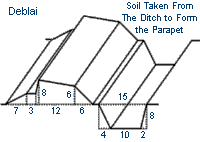 The
deblai was the quantity or volume of earth removed from an excavation,
particularly a ditch or trench. When heaped to form an embankment, such as
a parapet, the soil was referred to as the remblai. In the design of a
fortification it was necessary to regulate the quantity of soil extracted
from the ditch so that it match or nearly matched the quantity of soil required
to construct the parapet. In general, when the ditch was given the same
dimensions at all points of the trace the deblai at salient angles was greater
than the remblai required to construct the parapet at the salient while the
deblai taken from the ditch of a re-entering angle was not sufficient to
construct the parapets on either side of the re-entering. These difficulties
could be dealt with either by establishing extra working parties to transport
excess soil from the salients to the re-enterings, which could only be done
if time and labor were plentiful, or, more economically, by adjusting the
width and depth of the ditch at the salients and re-enterings to produce
the proper quantity of soil necessary for construction of the parapet. The
deblai was the quantity or volume of earth removed from an excavation,
particularly a ditch or trench. When heaped to form an embankment, such as
a parapet, the soil was referred to as the remblai. In the design of a
fortification it was necessary to regulate the quantity of soil extracted
from the ditch so that it match or nearly matched the quantity of soil required
to construct the parapet. In general, when the ditch was given the same
dimensions at all points of the trace the deblai at salient angles was greater
than the remblai required to construct the parapet at the salient while the
deblai taken from the ditch of a re-entering angle was not sufficient to
construct the parapets on either side of the re-entering. These difficulties
could be dealt with either by establishing extra working parties to transport
excess soil from the salients to the re-enterings, which could only be done
if time and labor were plentiful, or, more economically, by adjusting the
width and depth of the ditch at the salients and re-enterings to produce
the proper quantity of soil necessary for construction of the parapet. |